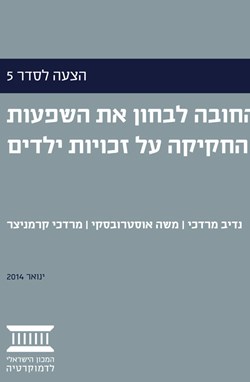The Duty to Examine the Impact of Legislation on the Rights of Children
Motion for the Agenda, January 2014
- Written By: Nadiv Mordechay, Moshe Ostrovsky
- Publication Date:
- Number Of Pages: 44 Pages
Recommended mechanisms for implementing the Registration of Information on the Influence of Legislation on the Child’s Right Law, 5762-2002, which will give it the appropriate weight and ensure that it is carried out properly in legislative processes in Israel.
In 2002, the Knesset passed the Registration of Information on the Influence of Legislation on the Child’s Right Law, 5762-2002. The aim of the law is to obligate Knesset members and the government to examine its impact on children’s rights, during the process of preparing a legislative proposal for the first reading in the Knesset. The law, as enacted, provides that the explanatory notes of every legislative proposal that, prima facie, has an impact on the rights of children, must specify that impact. The law also requires including in the explanatory notes the data that served as the basis for the conclusion drawn by those proposing the legislation about such impact.
The law, however, is not properly implemented with the result that—although certain legislative proposals do briefly note their impact on children—the analysis that is carried out is neither comprehensive nor sufficient. In too many instances, neither the impact nor the data upon which it is based appear. Moreover, although the Ministers of Justice and the Speakers of the Knesset were authorized to issue regulations in order to set forth specific rules for compliance with the provisions of the law, they have not done so. The High Court of Justice has also refrained from according sufficient importance to the provisions of the law.
Analysis of the Legal Status of the Law
The minimal implementation of the law stands in absolute contrast to its legal and constitutional importance. In our opinion, the provision regarding the inclusion of the law’s impact upon children’s rights has a quasi-constitutional character, that may establish a special legal duty to honor it. This is a fundamental law that covers every legislative proposal, and moreover is intended to protect the constitutional rights of children, and it must be carried out in the manner required by the international convention that Israel ratified. These two aspects confer upon it a status that is close to a constitutional one. Additionally, since it provides fundamental and general provisions regarding the legislative process in Israel, it should be viewed as a framework law with a special normative status.
The aim of the law is to obligate Knesset members and the government to examine its impact on children’s rights, during the process of preparing a legislative proposal for the first reading in the Knesset.
In view of these arguments, the time has come to accord to the Registration of Information on the Influence of Legislation on the Child’s Right Law, 5762-2002 the weight to which it is entitled and to make certain that it is indeed carried out properly in legislative processes in Israel.
Recommended Mechanisms for Implementing the Law
- The Minister of Justice and the Speaker of the Knesset must exercise their authority to issue regulations that will determine the scope of the specificity required within the duty to evaluate the impact of legislative proposals.
- Points of review should be established that would serve for the Knesset to insure that every legislative proposal set before it indeed fulfills the requirement to note its potential impact on the rights of children.
- Regarding private bills: The review should be made by the Knesset committees.
- Regarding governmental legislative proposals: The responsibility for compliance with the requirements of the law should be placed on the Ministerial Committee for Legislative Affairs. The Committee will be required to examine the matter prior to placing legislative proposals before the Knesset.
- The provisions of the law should be integrated with the activities of the Commission for the Rights of the Child, the legislation regarding which is currently being formulated and with the activities of the Committee on the Rights of the Child, as a supervisory entity.
- Until the establishment of the Commission, a dedicated unit should be allocated for this purpose within the relevant existing authorities, i.e., in the Ministry of Justice and the Knesset Center for Research and Information.
Points of review should be established that would serve for the Knesset to insure that every legislative proposal set before it indeed fulfills the requirement to note its potential impact on the rights of children. - The Legal Advisor of the Knesset should play a significant role both in issuing a legal opinion regarding the possible damage a proposed bill may cause to the constitutional rights of children and in providing legal advice to the authorized entities to prevent submission of a bill to the Knesset that does not meet the criterion of indicating its impact on children’s rights.
Nadiv Mordechay is a doctoral candidate at the Faculty of Law and the Center for the Study of Rationality of The Hebrew University of Jerusalem and a research assistant at the Israel Democracy Institute.
Moshe Ostrovsky has a degree in law, sociology and anthropology after completing an integrated program at The Hebrew University in Jerusalem and is a research assistant at the Israel Democracy Institute.
Prof. Mordechai Kremnitzer is Vice President of Research at the Israel Democracy Institute and a Professor Emeritus of Law at The Hebrew University of Jerusalem.
This proposal was written as part of IDI's “Democratic Principles" and "Reform of the Judiciary” projects, headed by Prof. Mordechai Kremnitzer. The "Reform of the Judiciary” project is conducted thanks to the generosity of the Berg Foundation.

